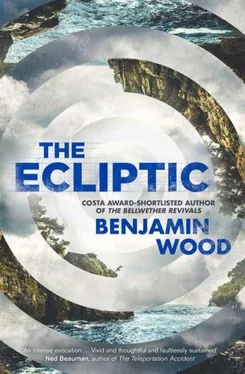I could sense that he was wilting, so I kept on at him. ‘Just take me when they say it’s all right.’
He huffed. ‘I really must get back to London by the afternoon. I’ve appointments, other patients to see.’
‘ Please , Victor. It’s important.’
‘I only planned on being here for one night.’
‘Then take me on the way home.’
‘You’re just like Jonathan, you know,’ he said. ‘I don’t respond well to this sort of pestering. It’s not how I prefer to do things.’
But I could tell that he had already decided.

The road took a dip and we were passing by the loch almost at the level of the shore. Boats and bright red buoys were moored out there in fitful patterns. Dinghies, sloops, and cruising yachts, tarpaulined. I did not want to ask Victor if he could see them, too. I just let them smear out behind the thickening treeline. One more turn and we approached a sign that welcomed us to Luss. ‘You’d better direct me from here,’ he said.
We went on, past low stone cottages, slate roofs, farm walls shaped like pommel horses, barbed-wire fences. We left grassland behind us, firs and oaks and chestnuts, ivy-coated monsters. The hummocks bulged in the dimness, patchy brown and misted under clouds. ‘It’s strange,’ I said. ‘Everything’s how I remember it.’
‘Why wouldn’t it be?’
‘It’s not the place I thought it was, that’s all.’
‘I don’t get what you mean.’
‘I know you don’t, Victor. It’s OK that you don’t.’
The stuccoed barns of the Colquhoun Arms were on our left now. I told Victor to go right, and, braking quickly, turning, we came along the road that Geoff Kerr had brought me down after the funeral. Quaint beige cottages with steaming chimneys on both sides and so much green. Up ahead of us: the pier. A shingle beach and placid water. A vast sky darkening above the frosted hills on the far side of the loch. It was familiar and yet somehow meaningless to me, this scenery. A backdrop to a play I had not seen.
‘You ought to park up,’ I said.
Victor rolled us slowly to a stop. We were right beside the pier now and I still felt so removed from what lay beyond the windscreen. I tried to think back to the night that I had left this place for Portmantle — when Jim had walked me to the bus that would carry me to Balloch. The way I still imagined it, I had travelled on to Glasgow, taken the train to catch a ferry at Dover, on to Calais, on to Paris, on to Milan, through Belgrade and Sofia, and into Istanbul. I could remember everything about that journey: from the noises of the Gare de Lyon to all the speckled china in the train carriages and the brief conversations I had held with other travellers. But the winter gloom of Luss was somehow less substantial in my memory.
I left the car and Victor trundled behind me. There was a wood-panelled building at the nearside of the pier and a hard-worn boardwalk ranging out into the loch. The water was clear enough in the shallows to see the pebble-bed and, further out, it creased and eddied as though stirred by something deep beneath. I came sideways down the steps and onto the shingle. There was a hollow underneath the pier’s stilts, and I got to my knees to search around in all the sand and grit and goose muck, one-handed. My sling pulled at my neck. ‘Can you tell me what I should be looking for?’ called Victor from behind me.
‘It’s like a tube, about eight or nine feet long. Wrapped up in black plastic sheeting.’
‘That shouldn’t be hard to miss.’
I scoured the damp and shadowed ground on both sides of the stilts. ‘Well, it isn’t here,’ I said.
Victor’s hands were in the pockets of his coat. He was staring left and right along the shore. ‘This beach runs all the way round. It’s miles.’
‘It can’t be far from here.’
‘Let’s try that way.’ He pointed south.
‘The cottage is the other way. It’s more likely to be north.’
‘If you say so.’
‘No, you’re right. The current might have washed it further out.’
I went south, combing the shoreline with my eyes, until the beach thinned out and there was nowhere left to walk. Nothing was floating on the loch that I wanted to see. ‘Let’s head back,’ I said, and Victor tracked my footsteps quietly. He walked a few yards behind, observing my behaviour, only partially invested in my search. ‘How long?’ he called.
‘Huh?’ I was looking north along the beach towards the pier again.
‘How long until you give this up?’
‘You could help me, you know, instead of hoping I’ll fail.’
‘Is that what you think I’m doing?’ he said.
‘I’m not sure.’
‘Let’s speed this up, Ellie. It’s getting late.’
But Victor did not understand that darkness was our ally. If the plastic had ripped back from the roll, the gleam of the paint would vent out. We might catch a glimpse of blue somewhere in the pitch-black night and follow it.
I peered down at the shingle, looking for a knoll or a raised edge where the mural might have been covered over, buried. There was nothing. I zigzagged up and down, checking the pavement side of the beach, walled off by cobbles. Nothing.
We reached the pier again and I checked through the windows of the wooden outhouse to see if it had been found and left there, leaned up in a corner as lost property. But no. It was only a closet of boxes.
Victor had stayed on the bank, propped against the bonnet of his car. He looked at his watch. ‘You haven’t checked up there,’ he said, thumbing north. ‘I’ll wait for you. My shoes are full of stones.’
I went down the slope, along the strip of shingle. A few small dinghies were moored in the shallows. There were four of them, differently coloured and named, with mainsails scrolled around their willow masts, tied off. All but one of them was tarpaulined at the stern.
Beside me, a partition of green hedgerows ran most of the way along the beach. Above that, a hummock bristling with tall trees. Cottages dotted the lip of the shore. I knew that Jim Culvers was not waiting for me in any of them. I understood that he had left me. I did not know precisely when, but he was gone. And there was nothing on the waterline for me to salvage, nothing that I hoped to see. So I turned back. Each dragging footstep on the shingle seemed to drain the spirit from me.
Victor was already in the car. The windows were fogging and I could hear the throbbing voices of the radio news. He wound down the window as I approached. ‘Forecast is for thunder and lightning this evening,’ he said. ‘I’d like to be off the motorway by then, if I can help it.’
I nodded, traipsing over. I did not want to think about the journey back to London or returning to my empty flat.
He turned the engine on. My shoulder was aching. But then, coming up the slope, I took one last glance towards the pier and I noticed something bobbing and scraping underneath the stilts, halfway along it. A bulky cigarette shape.
I went rushing for the boardwalk, forgetting the pain.
‘Ellie!’
Reaching the middle of the pier, I lay on my good side, got on my back.
‘Ellie!’
I slid under the railing.
Victor caught up with me. ‘You’re going to do yourself another injury like that. Get away from there.’
The peaceful loch was rippling under me. My legs were dangling over the boards.
Victor must have seen it in my eyes then, because he came lurching forwards with his arms to grapple me. But I was already dropping.
Victor waded to the shore, flinging water from his arms, peeling off his coat. His shirt was rinsed, translucent, and I could see the matted hairs of his torso underneath it. He had taken off his glasses to protect them, and was spitting the loch from his mouth, wringing his eyelids clear. I was on the gravel with my canvas roll beside me. I was soaked and tender, slingless. The pain was stabbing through my side, but I had enough relief in me to smother it. Victor had no such consolation — only the sight of me, safe and unharmed. ‘One of these days,’ he said, dripping at my feet, ‘I’m finding you a different therapist.’ He stooped to get his breath back, wheezing. ‘What the hell are you trying to do to me? I’m fifty years old, for crying out loud. I’m not cut out for this.’
Читать дальше













